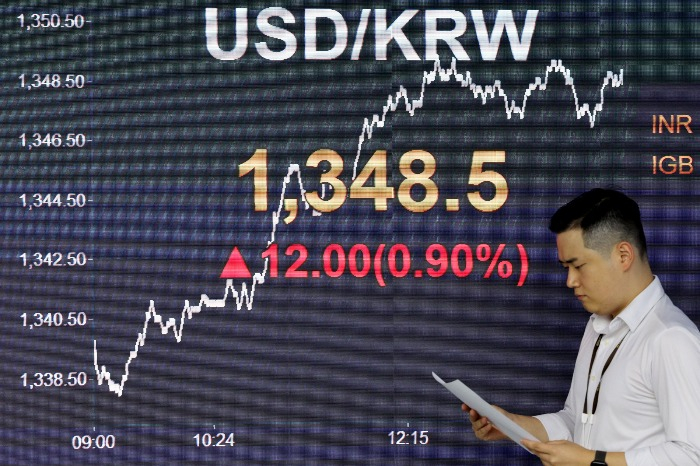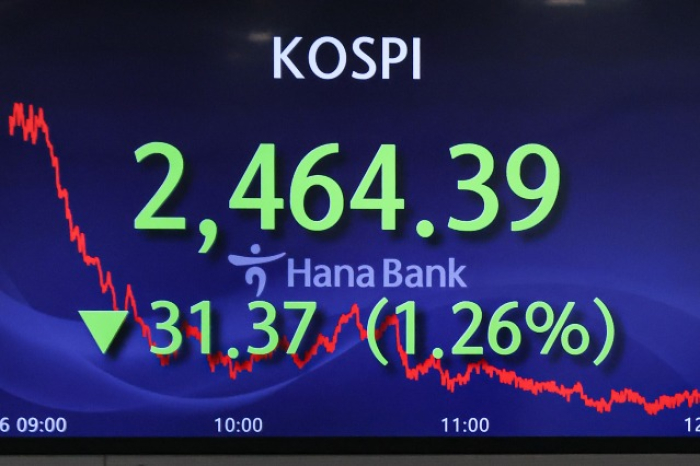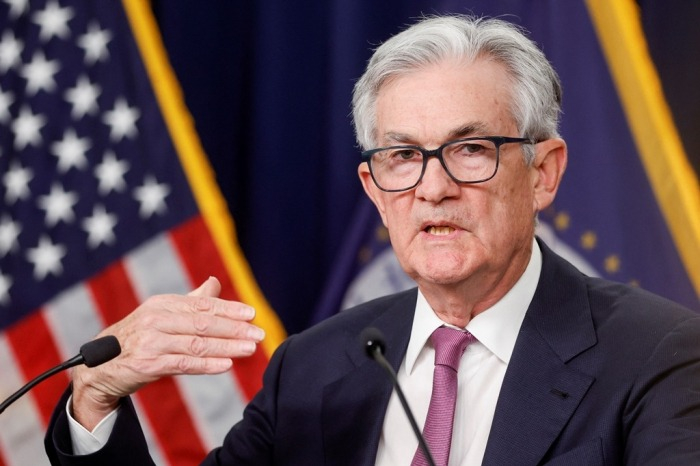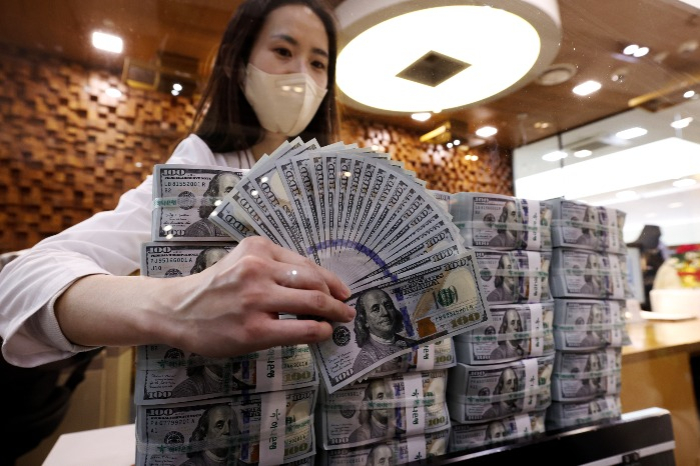Foreign exchange
Fed-triggered taper tantrum takes toll on Korean financial markets
The Korean won and government bonds tumbled to this year’s lows on Tuesday, weighing on the country’s stocks
By Sep 26, 2023 (Gmt+09:00)
4
Min read
Most Read
LG Chem to sell water filter business to Glenwood PE for $692 million


KT&G eyes overseas M&A after rejecting activist fund's offer


Kyobo Life poised to buy Japan’s SBI Group-owned savings bank


StockX in merger talks with Naver’s online reseller Kream


Meritz backs half of ex-manager’s $210 mn hedge fund



The South Korean financial markets were roiled by a fresh taper tantrum after the US Federal Reserve chair signaled further tightening last week, triggering selloffs of the Korean currency, bonds and stocks.
On Tuesday, the US dollar closed at 1,348.50 won, up 12 won from the previous session. This is the highest level since Nov. 23, meaning a 10-month low for the Korean currency. The dollar/won even hit a daily high of 1,349.50.
The Korean currency extended its losing streak due to the flying greenback after the US 10-year Treasury yield jumped to 4.5%, the highest in 16 years.
The US dollar index, a measure of the dollar value relative to a basket of six foreign currencies, climbed to 106.10, the highest since November last year.
The dollar index and US treasury yields have been shooting up since last Wednesday when US Fed Chair Jerome Powell signaled more rate hikes ahead.
Korean bonds followed their US counterparts on Tuesday. The 10-year debt yield added 4.2 basis points to end at 4.054%, hitting this year’s new high after breaking the previous record of 4.031% on Sept. 21.
The higher the yield, the lower the bond price. The bond yield and price move in opposite directions.
Capital flight was also witnessed in the Korean stock market as investors brace for further tightening by the US central bank.

The country’s benchmark stock index Kospi lost 1.3% to close at 2,462.97 on Tuesday.
“The surge in the US 10-year Treasury yield has caused a (new) taper tantrum,” said Park Sang-hyun, an analyst at Hi Investment & Securities Co. “All Korean stocks, bonds and currency are faltering together.”
Taper tantrum refers to the panic selling of US Treasuries, which triggered a spike in their yields, in 2013 in response to the Fed’s signal to end its quantitative easing program.
WON UNDER DOWNWARD PRESSURE
The outlook for the Korean currency looks dim in anticipation of a long period of high rates in the US, said market analysts.
Some even forecast that the dollar/won would top 1,400 within this year.
“The rally in US Treasury yields, which has further weakened the Korean won value against the US dollar, was triggered by the anticipation of the longer higher US rates,” said Kim Seung-hyuk, an analyst at NH Futures Co. “Oil prices are flirting with $100 per barrel, and the expected inflation rate is rising, creating upward pressure on the dollar index.”
The Fed last week left the fed funds rate in a target range between 5.25-5.50% but opened the door to at least one more hike with a projection of this year’s peak benchmark overnight interest rate at 5.6%.

Its policymakers also projected an end-of-2024 policy rate of at least 5.1% versus their previous projection of 4.6%.
The dollar is also gaining strength amid the growing risk of a US government shutdown as lawmakers in the world’s biggest economy have yet to agree on a federal spending bill. Congress should pass the bill by Oct. 1 to prevent the US government from shutting down.
Global credit rating service Moody’s on Monday warned of a cut in its credit rating on the US if Washington freezes. It rates the world’s No. 1 economy “Aaa” with a stable outlook, the highest among the global top three credit agencies.
A month ago, Fitch downgraded the US by one notch to AA+, the same rating assigned by S&P Global in 2011.
BONDS IN DOWNWARD SPIRAL
If the US credit rating is lowered, US Treasury yields could further zoom, paving the way for a further rise in the greenback.
At times when other major currencies show no sign of recovery, investors rely more on the dollar.
“Other economies like those in Europe grappling with the economic downturn can’t raise their rates like the US,” said Shin Se-don, professor of Economics at Sookmyung Women’s University in Seoul. “The dollar/won could top 1,400 this year as investors believe the dollar is the only reliable currency.”

Bond yields are also expected to continue to rise.
“The US 10-year Treasury yield could rise to the low 5% range,” said Moon Hong-cheol, an economist at DB Financial Investment. “Local (Korean) bond yields are also forecast to extend their rising streak.”
BOK FACES DILEMMA
If the US policy rate is hiked by another a quarter percentage point this year, its gap with Korean borrowing costs could widen to a record high of 2.25 percentage points as Korea’s policy interest rate is at 3.50%.
This would further accelerate capital outflows from Asia’s fourth-largest economy and drag the won down even more.
To prevent capital flight, the Korean central bank may consider another rate hike before the end of this year, a move doubted by market analysts, given the country’s weak economic growth.
A revived rate hike would delay a recovery in the Korean economy hit hard by already high interest rates, a softer won, increasing oil prices and sluggish exports.
The Bank of Korea’s next monetary policy meeting is scheduled for Oct. 19.
Write to Do-Won Lim and Sin-Young Park at van7691@hankyung.com
Sookyung Seo edited this article.
More to Read
-
 Central bankKorean financial markets tumble as Fed signals higher rates
Central bankKorean financial markets tumble as Fed signals higher ratesSep 21, 2023 (Gmt+09:00)
5 Min read -
 Banking & FinanceKorea’s time deposit rates head north on higher bank bonds’ coupon
Banking & FinanceKorea’s time deposit rates head north on higher bank bonds’ couponAug 07, 2023 (Gmt+09:00)
3 Min read -
 Central bankBOK keeps door open for another rate hike on Fed, debts
Central bankBOK keeps door open for another rate hike on Fed, debtsJul 13, 2023 (Gmt+09:00)
3 Min read -
 Foreign exchangeS.Korea, Japan to resume bilateral currency swap for dollars
Foreign exchangeS.Korea, Japan to resume bilateral currency swap for dollarsJun 28, 2023 (Gmt+09:00)
3 Min read -
 Foreign exchangeKorean won near 5-month low despite weak dollar; outlook dark
Foreign exchangeKorean won near 5-month low despite weak dollar; outlook darkApr 21, 2023 (Gmt+09:00)
4 Min read
Comment 0
LOG IN


